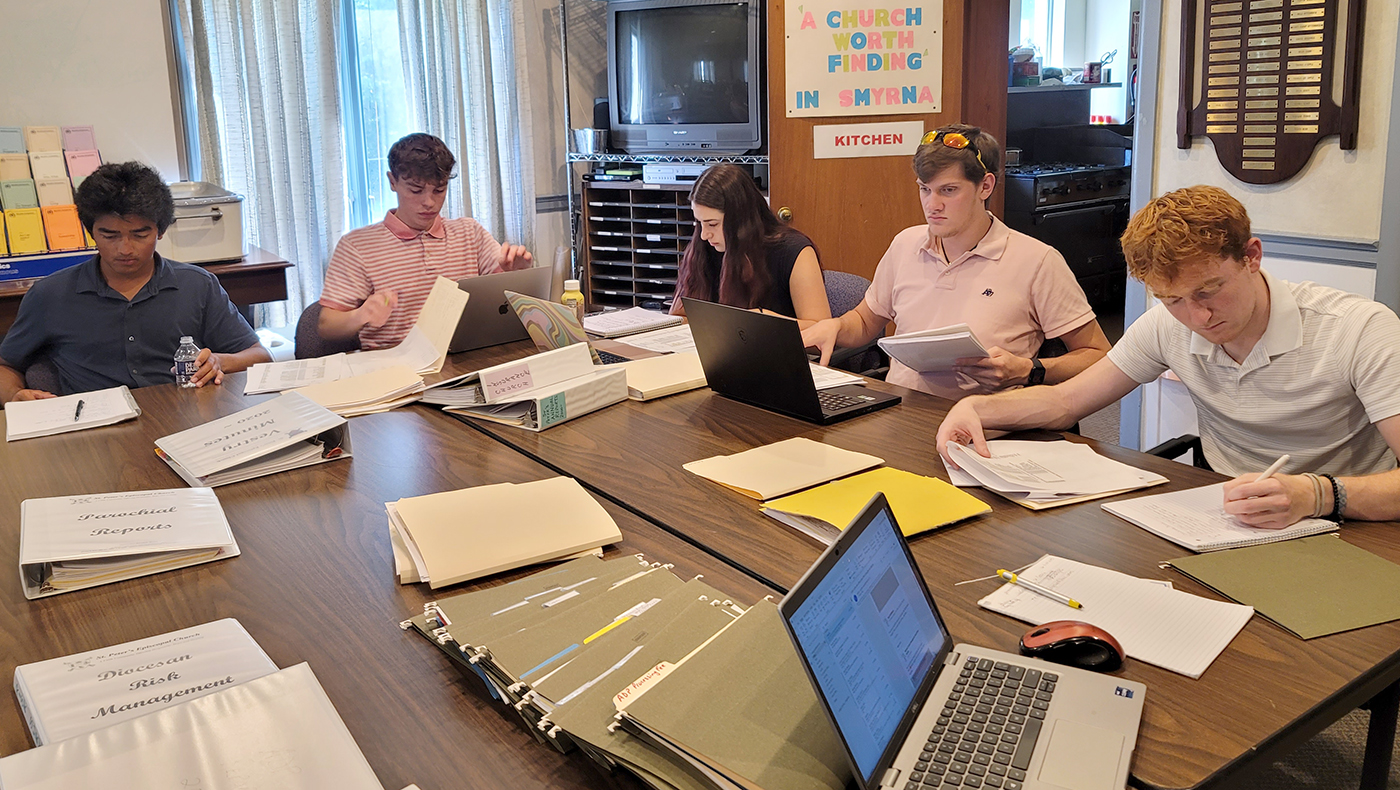The parishes have a need. The students have a skill. And, a volunteer program from the Department of Accounting and MIS at the University of Delaware’s Alfred Lerner College of Business and Economics brings them together.
The Episcopal Church is an international denomination based mostly in the U.S. It requires parishes in a diocese to get an annual audit, but audits can be time-consuming and expensive. Several years ago, the Episcopal Church in Delaware approached the Accounting and MIS Department at the Lerner College with an idea: Could they hire accounting students to perform the annual parish audits?
“It’s been … very, very rewarding on both sides,” said Judith Lane Gregory, canon for finance for the Episcopal Church in Delaware (similar to a CFO). The parishes get much-needed accounting expertise and the students get experience auditing a nonprofit.
Each spring, the participating UD Lerner accounting students, usually in their first or second years, begin by reviewing the Delaware diocese’s audit program. This prescribes the steps needed to accomplish the parishes’ financial audit. Students kick things off by traveling to St. Pauls in Camden, Delaware, auditing the parish of the Diocesan Council Treasurer, Francis (“Frank”) Daniels.
Given Daniels’ financial expertise, the students use him as a resource for their first hands-on experience as auditors. As with any new audit, the students must also familiarize themselves with financial lingo unique to nonprofits and to parishes. They look at the big picture of the church’s finances, then hone in on cash balances, investments and income, cash disbursements, liabilities, payroll and more.
The students get class credit for their participation and a small stipend from the diocese and participating parishes. Debra Dragone, senior instructor of accounting at Lerner, said the department tried to waive the need for a stipend, saying the students would get credit, but the diocese insisted on paying the students and covering their expenses. Available spots for students depend on parish interest each year, and the instructor reviews candidates. Dragone added the best part of the program is that students have a meaningful way of giving to others, using their professional skills.
They don’t discuss religion in the audits. “It would just be like a public accounting firm… that got the Diocese of Delaware as a client,” Dragone said. Moreover, while the department started the program with the Episcopal Diocese of Delaware, it is open to the idea of including other local nonprofits to extend the Accounting and MIS Department’s commitment to the community.
Honors accounting student Bryce Franklin, now a junior, joined the program in its first year in 2022. He was a little hesitant at first because he’s trying to finish his bachelor’s and master’s degree in four years, a pace that leaves him very busy. But, he decided the volunteer effort was “too good of an opportunity to pass up.” It’s helped him learn problem-solving and gain a better grasp of accounting, he said.
He didn’t regret it, signing on for the second year this spring. Now, Franklin has a leadership role in the program, helping mentor new students and serving as a project manager. “Professionally, it is something that I include on my resume, and something that I have been asked about in interviews, because it’s not necessarily a common thing for people to have experience with.”
For the parishes, it’s not only an affordable solution to fulfill a mandate, but an opportunity to get their financial recordkeeping in order. This is especially helpful for smaller congregations that lack financial experts. The audits highlight processes that can be improved and done differently, Daniels said. They bring in an objective outsider to offer insight and recommendations.
“What I heard from the first year was that the parishes who participated learned so much about themselves,” Gregory said.
On the student side, they garner experience outside the classroom.
Dragone notes the advantage student auditors have when looking for permanent positions. The big global firms are looking for auditors, she says. “This is just a wonderful way to become familiar with how people do their books and demonstrates the students’ interest in gaining relevant experience so they can hit the ground running.”
She also points to a chance to develop “soft skills” that students may not get in a classroom setting. Thanks to this program, students learn to present themselves professionally, interact with clients, and write up formal reports. “Students’ social skills are really enhanced, because they’re interviewing real clients. Students learn flexibility and problem solving, because audits rarely go exactly according to plan. And that’s a great, great thing.”
The program was a growing experience for Franklin, who said he tends to be pretty introverted. “At this point, I feel much more comfortable with not only the audit practice, but also being able to collect information and talk with clients,” he said. He also felt better prepared for his internship and entry into the workforce.
“It’s shrinking,” Gregory said of the accounting profession. “And so for me, one of the things about this program is that you can get students engaged early and excited about the work.”
The students are actively involved and ask good questions, Daniels says. “It’s been great. The kids are really smart. They’re eager to learn.”
Out of the more than 30 parishes in Delaware, the collaboration has grown from nine in the first year to 12 this past year. Student participation also increased, and Dragone is hoping to expand that even further.




